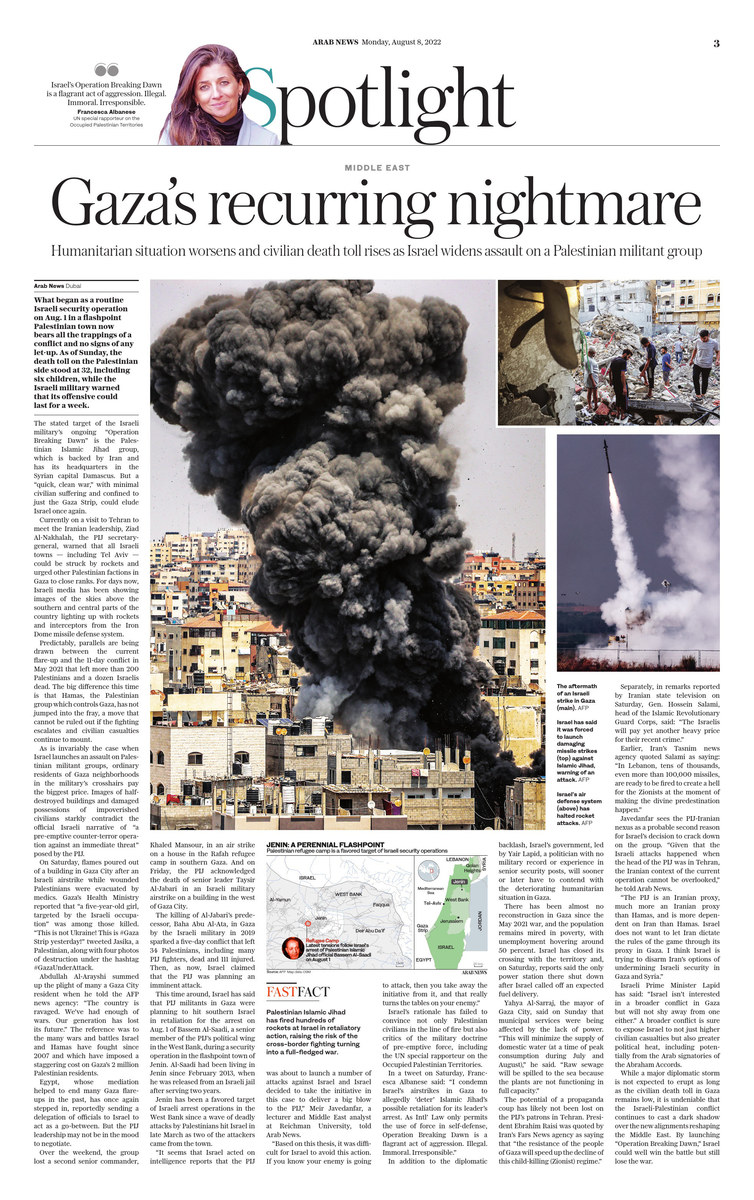DUBAI: What began as a routine Israeli security operation on Aug. 1 in a flashpoint Palestinian town in the West Bank, in the space of just a few days, took on the trappings of a full-blown conflict. By Sunday night, the death toll on the Palestinian side had soared to 44, including 15 children, when an Egyptian-brokered surprise truce brought welcome relief to the Gaza Strip’s war-weary population.
The target of the Israeli military’s “Operation Breaking Dawn” was the Palestinian Islamic Jihad (PIJ) group, which is backed by Iran and has its headquarters in the Syrian capital Damascus. But the goal of a “quick, clean war,” causing maximum damage to the PIJ with minimal civilian suffering and confined to just the Gaza Strip, could yet elude Israel if the ceasefire deal falls through.
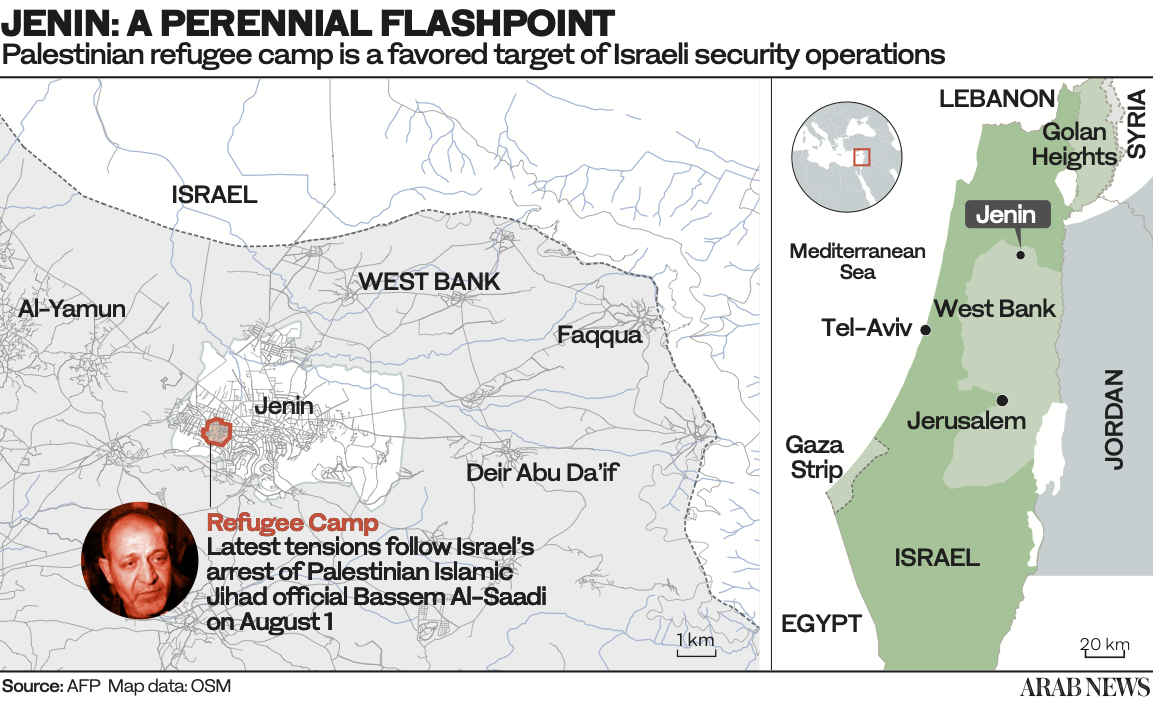
During a recent visit to Tehran to meet the Iranian leadership, Ziad Al-Nakhalah, the PIJ general-secretary, warned that all Israeli towns — including Tel Aviv — could be struck by rockets and urged other Palestinian factions to join forces. For days, Israeli media had been showing images of the skies above the southern and central parts of the country lighting up with rockets and interceptors from the Iron Dome missile defense system.
Predictably, parallels were being drawn between the latest flare-up and the 11-day conflict in May 2021 that left more than 200 Palestinians and a dozen Israelis dead. The big difference this time was that Hamas, the Palestinian group which controls Gaza, did not jump into the fray, a move that cannot be ruled out if the truce fails to hold and civilian casualties continue to mount.
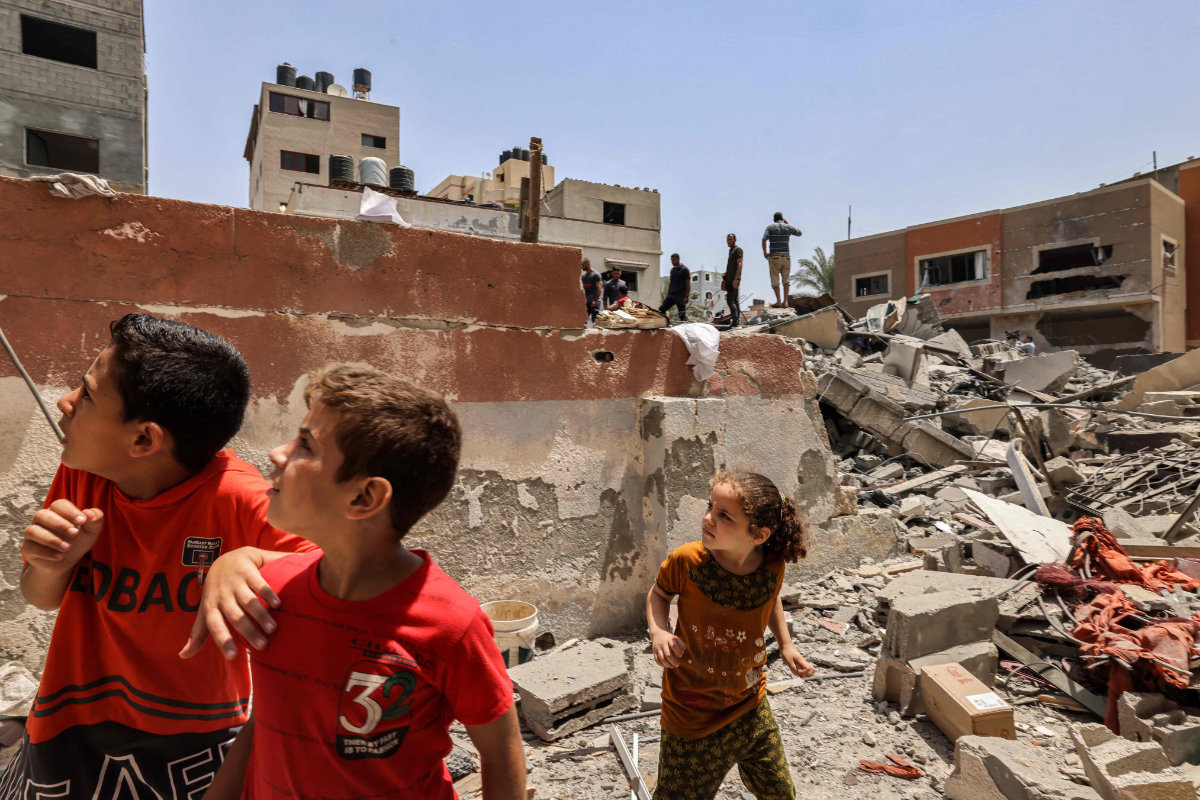
Children react following an Israeli air strike in Khan Yunis in the southern Gaza Strip on Aug.6, 2022. (AFP)
As is invariably the case when Israel launches an assault on Palestinian militant groups, ordinary residents of Gaza neighborhoods in the military’s crosshairs paid the biggest price. Images of half-destroyed buildings and damaged possessions of impoverished civilians starkly contradicted the official Israeli narrative of “a pre-emptive counterterror operation against an immediate threat” posed by the PIJ.
On Saturday, flames poured out of a building in Gaza City after an Israeli airstrike while wounded Palestinians were evacuated by medics. Gaza’s Health Ministry reported that “a five-year-old girl, targeted by the Israeli occupation” was among those killed. “This is not Ukraine! This is #Gaza Strip yesterday!” tweeted Jasika, a Palestinian, along with four photos of destruction under the hashtag #GazaUnderAttack.
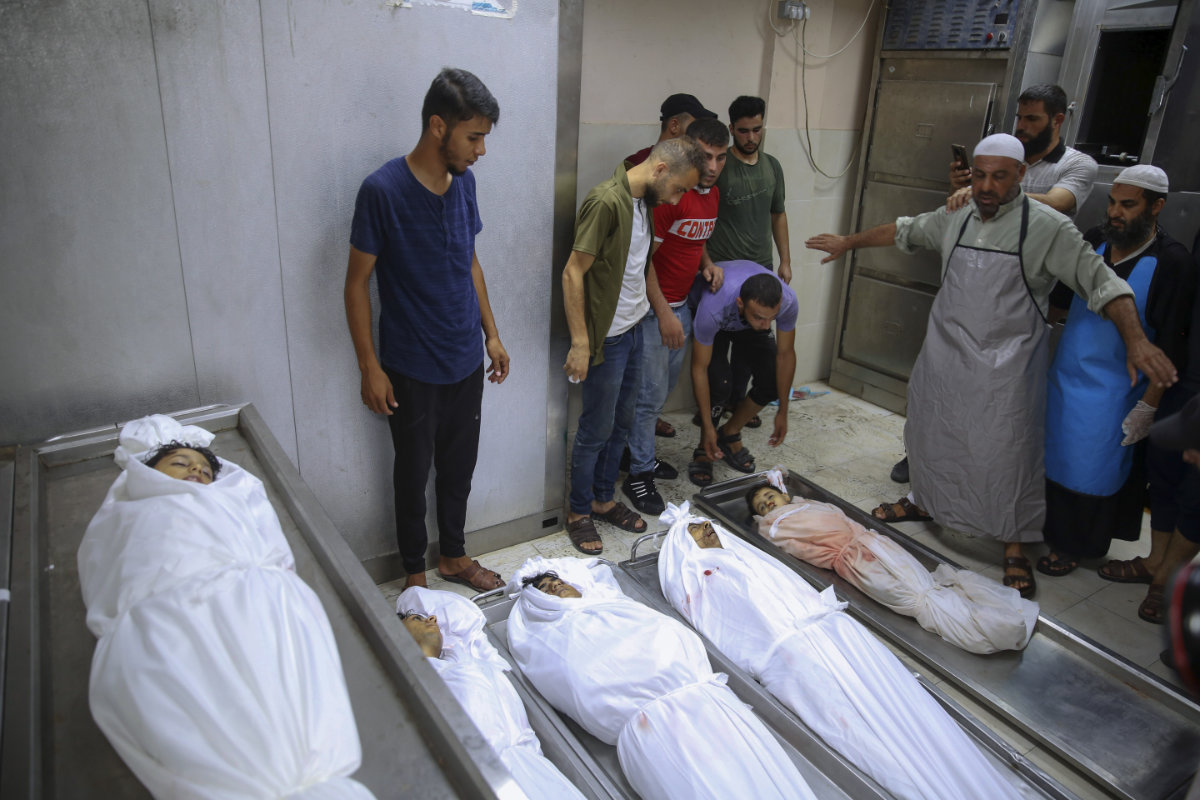
Mourners pray over the bodies of six children killed in an explosion in Jebaliya refugee camp in northern Gaza Strip on Aug. 6, 2022. (AP/Abdel Kareem Hana)
Abdullah Al-Arayshi summed up the collective plight of Palestinians in Gaza when he told the AFP news agency: “The country is ravaged. We’ve had enough of wars. Our generation has lost its future.” The reference was to the many wars and battles Israel and Hamas have fought since 2007 and which have imposed a staggering cost on Gaza’s 2 million Palestinian residents.
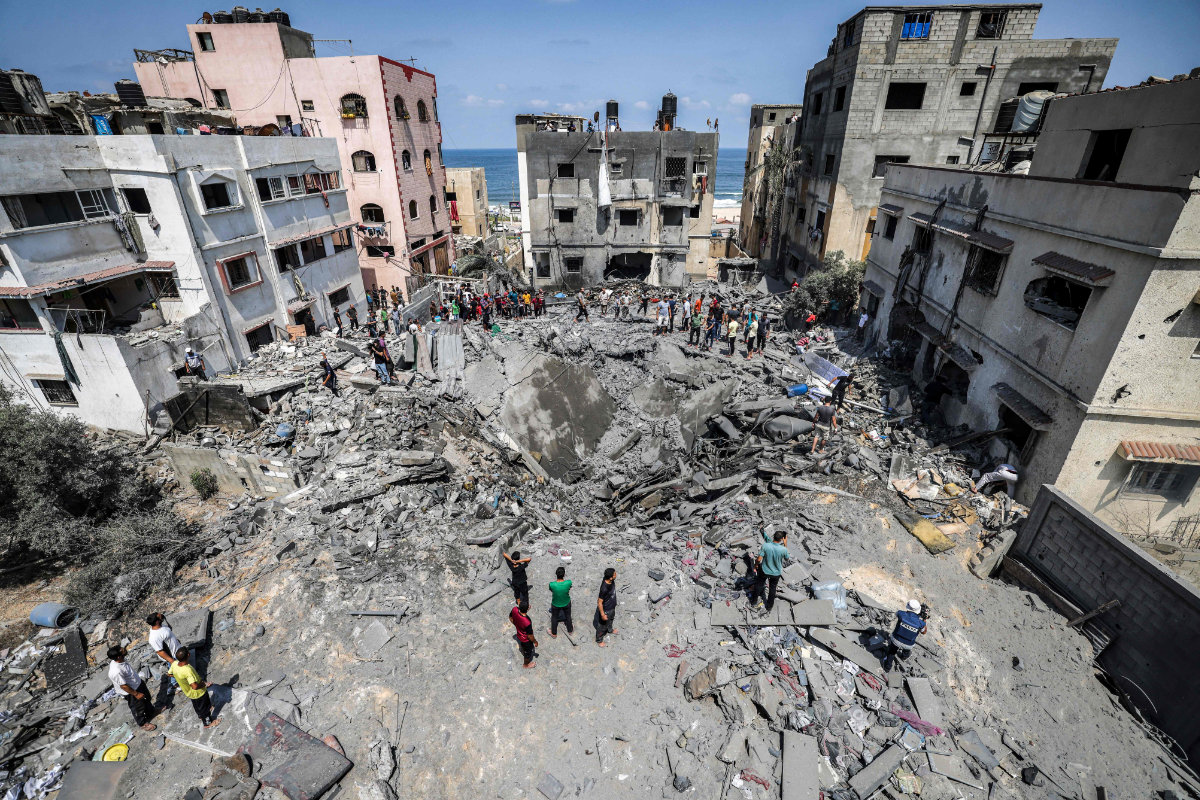
Palestinians inspect the ruins of a building destroyed by an Israeli air strike in Gaza City on August 6, 2022. (AFP)
Egypt, whose mediation has helped to end many Gaza flare-ups in the past, once again stepped in, reportedly sending a delegation of officials to Israel to act as a go-between. The PIJ leadership may not have been in the mood to negotiate, but its options were limited.
On Saturday, the group lost a second senior commander, Khaled Mansour, in an Israeli military strike on a house in the Rafah refugee camp in southern Gaza. The previous day, the PIJ had acknowledged the death of senior leader Taysir Al-Jabari in an airstrike on a building in the west of Gaza City.
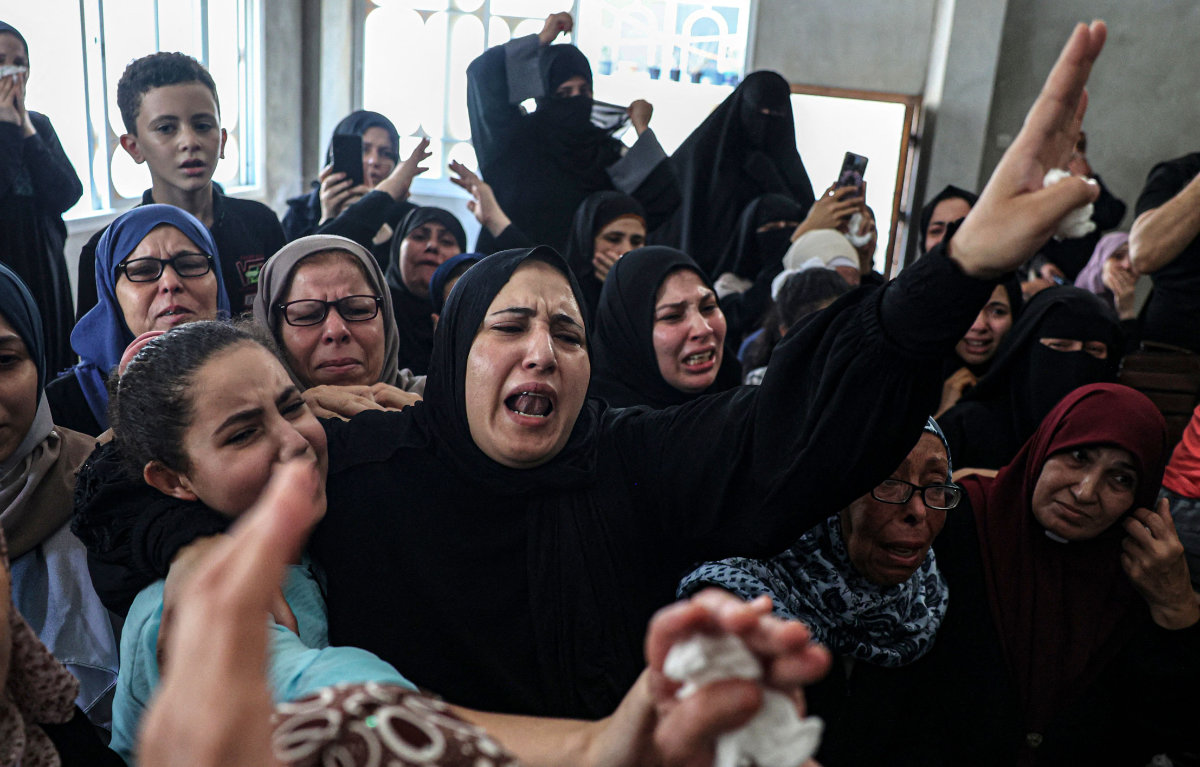
Relatives react during the funeral of Khaled Mansour, an Islamic Jihad commander killed in an Israeli air strike on Rafah on August 7, 2022. (Said Khatib / AFP)
The killing of Al-Jabari’s predecessor, Baha Abu Al-Ata, in Gaza by the Israeli military in 2019 sparked a five-day conflict that left 34 Palestinians, including many PIJ fighters, dead and 111 injured. Then, as now, Israel claimed that the PIJ was plotting an imminent attack.
This time around, Israel said that PIJ militants in Gaza were planning to hit southern Israel in retaliation for the arrest of Bassem Al-Saadi, a senior member of the PIJ’s political wing in the West Bank, during the Aug. 1 security operation in Jenin. Al-Saadi had been living there since February 2013, when he was released from an Israel jail after serving two years.
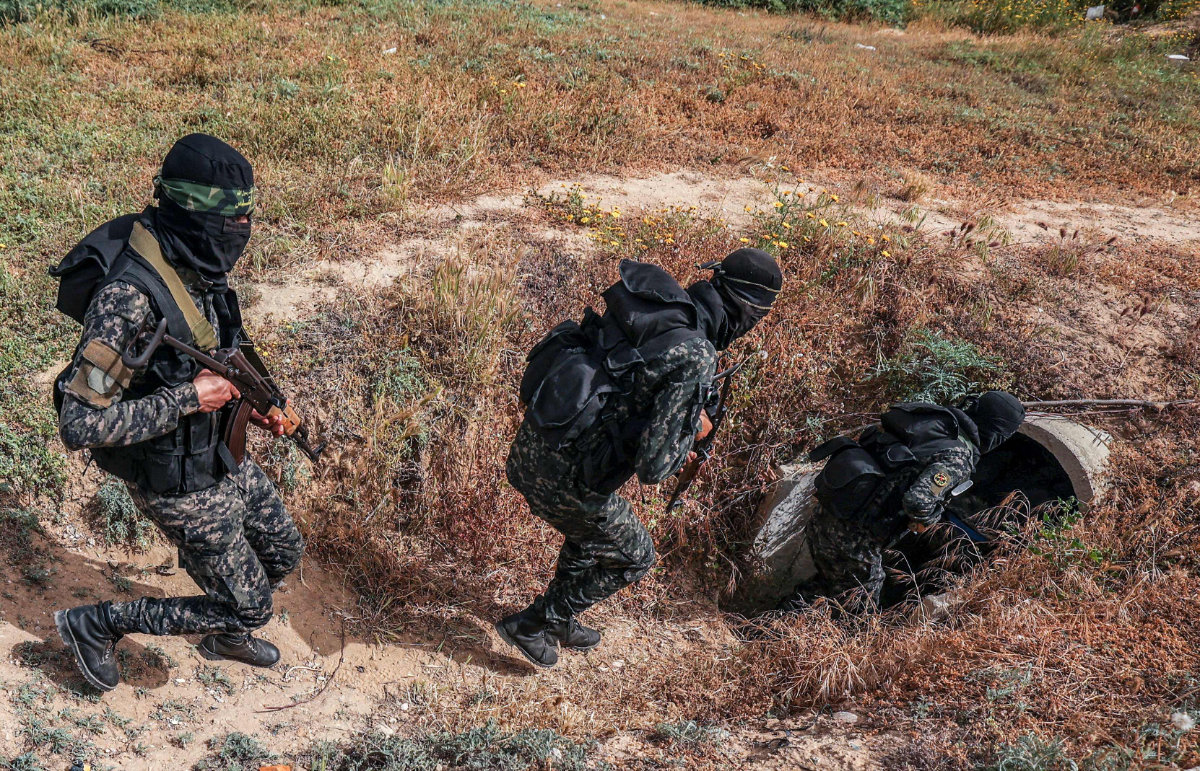
In this photo taken on April 17, 2022, Islamic Jihad fighters enter an underground tunnel in the Gaza strip. (Mahmud Hams / AFP)
Jenin has been a frequent target of Israeli arrest operations in the West Bank since a wave of deadly attacks by Palestinians hit Israel in late March as two of the attackers came from the town.
“It seems that Israel acted on intelligence reports that the PIJ was about to launch a number of attacks against Israel and Israel decided to take the initiative in this case to deliver a big blow to the PIJ,” Meir Javedanfar, a lecturer and Middle East analyst at Reichman University, told Arab News.
“Based on this thesis, it was difficult for Israel to avoid this action. If you know your enemy is going to attack, then you take away the initiative from it, and that really turns the tables on your enemy.”
Israel’s rationale, though, failed to convince not only Palestinian civilians in the line of fire but also critics of the military doctrine of pre-emptive force, including the UN special rapporteur on the occupied Palestinian territories.
In a tweet on Saturday, Francesca Albanese said: “I condemn Israel’s airstrikes in Gaza to allegedly ‘deter’ Islamic Jihad’s possible retaliation for its leader’s arrest. As Intl’ Law only permits the use of force in self-defense, Operation Breaking Dawn is a flagrant act of aggression. Illegal. Immoral. Irresponsible.”
In addition to the diplomatic backlash, Israel’s government, led by Yair Lapid, a politician with no military record or experience in senior security posts, would sooner or later have had to contend with the deteriorating humanitarian situation in Gaza.
There has been almost no reconstruction in Gaza since the May 2021 war, and the population remains mired in poverty, with unemployment hovering around 50 percent. Israel has closed its crossing with the territory and, on Saturday, reports said the only power station there shut down after Israel called off an expected fuel delivery.
Yahya Al-Sarraj, the mayor of Gaza City, said on Sunday that municipal services were being affected by the lack of power. “This will minimize the supply of domestic water (at a time of peak consumption during July and August),” he said. “Raw sewage will be spilled to the sea because the plants are not functioning in full capacity.”
Unsurprisingly, the potential of a propaganda coup was not lost on the PIJ’s patrons in Tehran. President Ebrahim Raisi was quoted by Iran’s Fars News agency as saying that “the resistance of the people of Gaza will speed up the decline of this child-killing (Zionist) regime.”
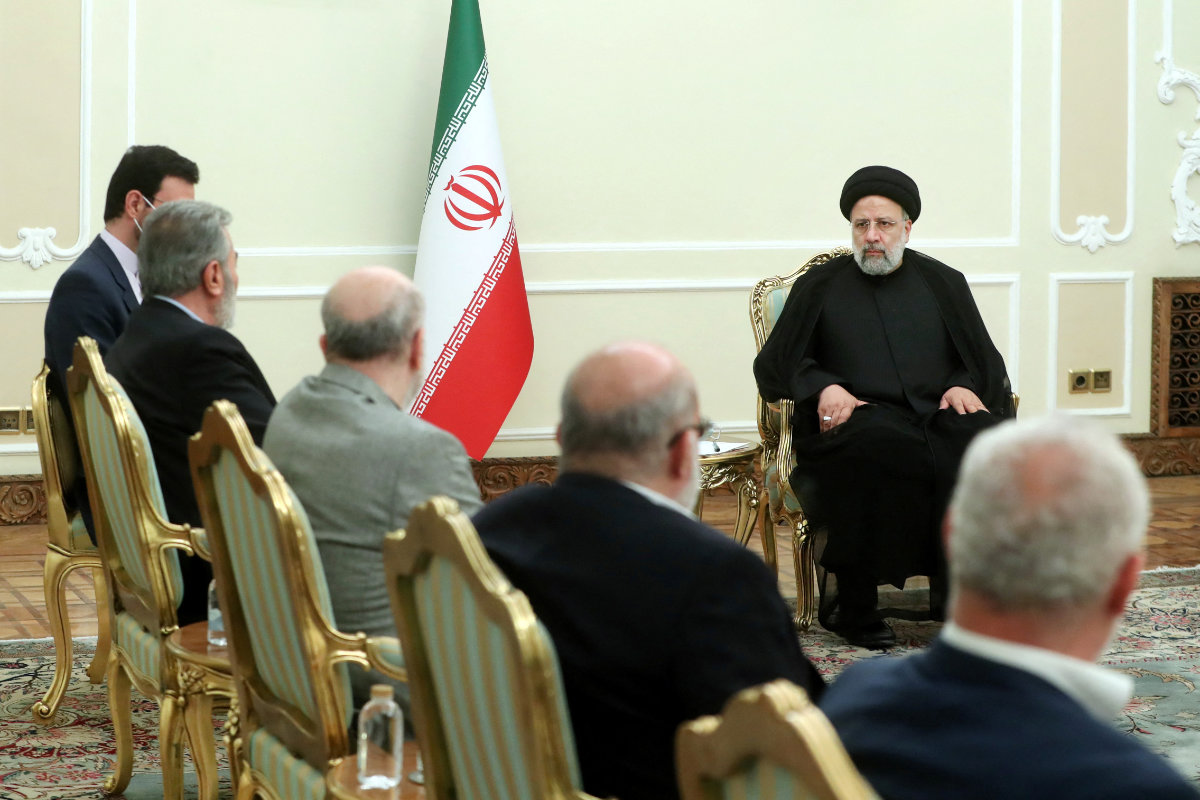
Iranian President Ebrahim Raisi meets with Ziyad Nakhaleh, secretary-general of the Palestinian Islamic Jihad Movement, in Tehran on August 4, 2022. (WANA via REUTERS)
Separately, in remarks reported by Iranian state television on Saturday, Gen. Hossein Salami, head of the Islamic Revolutionary Guard Corps, said: “The Israelis will pay yet another heavy price for their recent crime.”
Earlier, Iran’s Tasnim news agency quoted Salami as saying: “In Lebanon, tens of thousands, even more than one hundred thousand missiles, are ready to be fired to create a hell for the Zionists at the moment of making the divine predestination happen.”
Javedanfar considers the PIJ-Iranian nexus a probable second reason for Israel’s decision to crack down on the group. “Given that the Israeli attacks happened when the head of the PIJ was in Tehran, the Iranian context of the current operation cannot be overlooked,” he told Arab News.
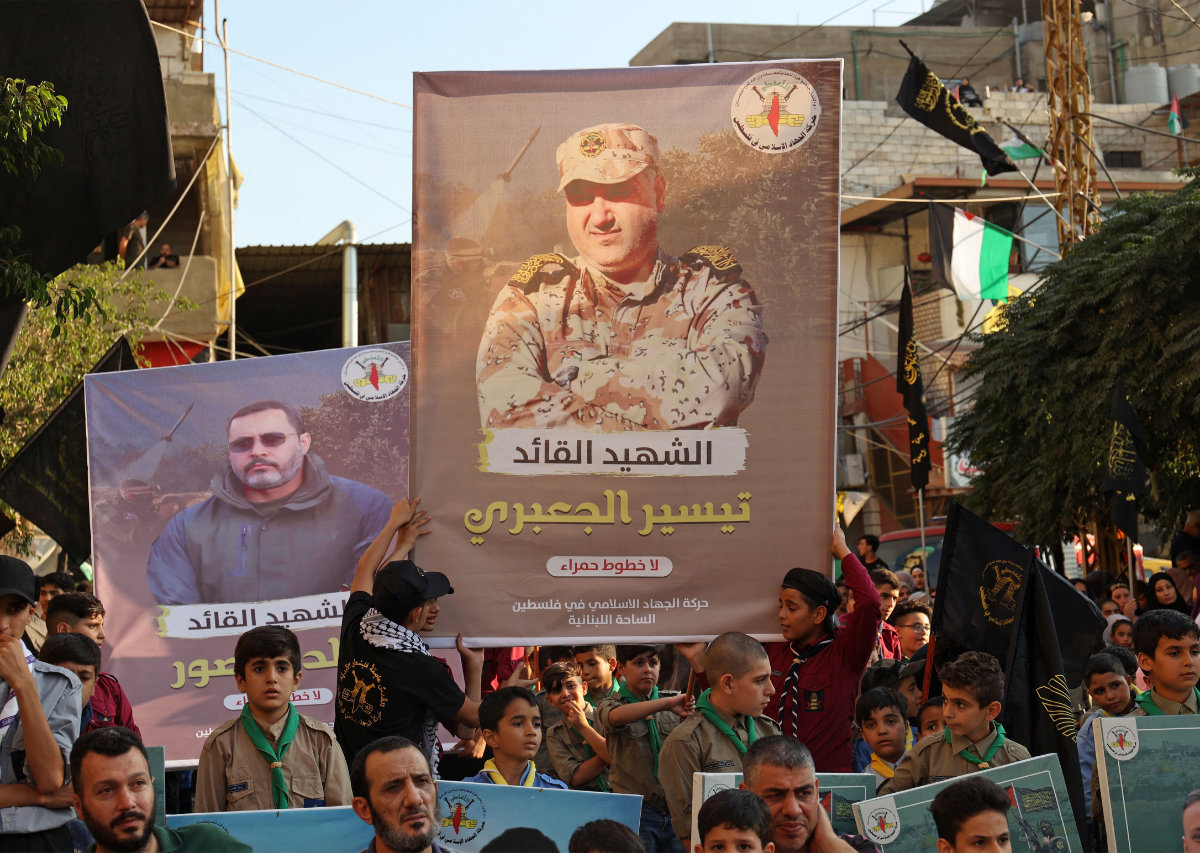
Palestinians rally in Lebanon's refugee camp of Burj al-Barajneh on Aug. 7, 2022, in support of the Islamic Jihad group march in its fight with Israel. (Anwar Amro / AFP)
“The PIJ is an Iranian proxy, much more an Iranian proxy than Hamas, and is more dependent on Iran than Hamas. Israel does not want to let Iran dictate the rules of the game through its proxy in Gaza. I think Israel is trying to disarm Iran’s options for undermining Israeli security in both Gaza and Syria.”
Lapid, the Israeli prime minister, had averred that “Israel isn’t interested in a broader conflict in Gaza but will not shy away from one either.” Indeed, a broader conflict was sure to expose Israel to not just higher civilian casualties but also greater political heat, including potentially from the Arab signatories of the Abraham Accords.
In the best-case scenario for Israel, the PIJ’s military wing would have been decapitated, the civilian death toll in Gaza would have stayed low, and the diplomatic storm would have passed quickly. But given the dark shadow that the Palestinian conflict continues to cast over the Arab-Israeli alignments reshaping Middle East geopolitics, Israel could still have ended up winning the battle yet losing the war.
